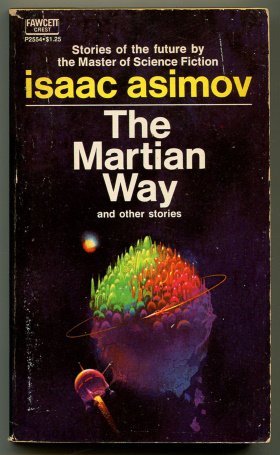The ground trembled gently.
Rioz said, ‘Something bothering you about the Shadow?’
They called it that. It was the nearest fragment of the rings, quite close considering that they were at the outer rim of the rings, where the pieces spread themselves relatively thin. It was perhaps twenty miles off, a jagged mountain, its shape clearly visible.
‘How does it look to you?’ asked Long.
Rioz shrugged. ‘Okay, I guess. I don’t see anything wrong.’
‘Doesn’t it seem to be getting larger?’
‘Why should it?’
‘Well, doesn’t it?’ Long insisted.
Rioz and Swenson stared at it thoughtfully.
‘It does look bigger,’ said Swenson.
‘You’re just putting the notion into our minds,’ Rioz argued. ‘If it were getting bigger, it would be coming closer.’
‘What’s impossible about that?’
‘These things are on stable orbits.’
‘They were when we came here,’ said Long. ‘There, did you feel that?’
The ground had trembled again.
Long said, ‘We’ve been blasting this thing for a week now. First, twenty-five ships landed on it, which changed its momentum right there. Not much, of course. Then we’ve been melting parts of it away and our ships have been blasting in and out of it – all at one end, too. In a week, we may have changed its orbit just a bit. The two fragments, this one and the Shadow, might be converging.’
‘It’s got plenty of room to miss us in.’ Rioz watched it thoughtfully. ‘Besides, if we can’t even tell for sure that it’s getting bigger, how quickly can it be moving? Relative to us, I mean.’
‘It doesn’t have to be moving quickly. Its momentum is as large as ours, so that, however gently it hits, we’ll be nudged completely out of our orbit, maybe toward Saturn, where we don’t want to go. As a matter of fact, ice has a very low tensile strength, so that both planetoids might break up into gravel.’
Swenson rose to his feet. ‘Damn it, if I can tell how a shell is moving a thousand miles away, I can tell what a mountain is doing twenty miles away.’ He turned toward the ship.
Long didn’t stop him.
Rioz said, ‘There’s a nervous guy.’
The neighboring planetoid rose to zenith, passed overhead, began sinking. 1wenty minutes later, the horizon opposite that portion behind which Saturn had disappeared burst into orange flame as its bulk began lifting again.
Rioz called into his radio, ‘Hey, Dick, are you dead in there?’
‘I’m checking,’ came the muffled response.
‘Is it moving?’ asked Long.
‘Yes.’
‘Toward us?’
There was a pause. Swenson’s voice was a sick one. ‘On the nose, Ted. Intersection of orbits will take place in three days.’
‘You’re crazy!’ yelled Rioz.
‘I checked four times,’ said Swenson.
Long thought blankly, What do we do now?
9
Some of the men were having trouble with the cables. They had to be laid precisely; their geometry had to be very nearly perfect for he 1:1a netic field to attain maximum strength. In space, or even m air, it wouldn’t have mattered. The cables would have lined up automatically once the juice went on.
Here it was different. A gouge had to be plowed along the planetoid’s surface and into it the cable had to be laid. If it were not lined up within a few minutes of arc of the calculated direction, a torque would be applied to the entire planetoid, with consequent loss of energy, none of which could be spared. The gouges then had to be redriven, the cables shifted and iced into the new positions.
The men plodded wearily through the routine.
And then the word reached them:
‘All hands to the jets!’
Scavengers could not be said to be the type that took kindly to discipline. It was a grumbling, growling, mutteri g gr up that set bout disassembling the jets of the ships that yet remained intact, carrymg them to the tail end of the planetoid, grubbing them into pos1t1on, and strmgmg the leads along the surface.
It was almost twenty-four hours before one of them looked into the sky and said, ‘Holy jeepers!’ followed by something less printable.
His neighbor looked and said, ‘I’ll be damned!’

























